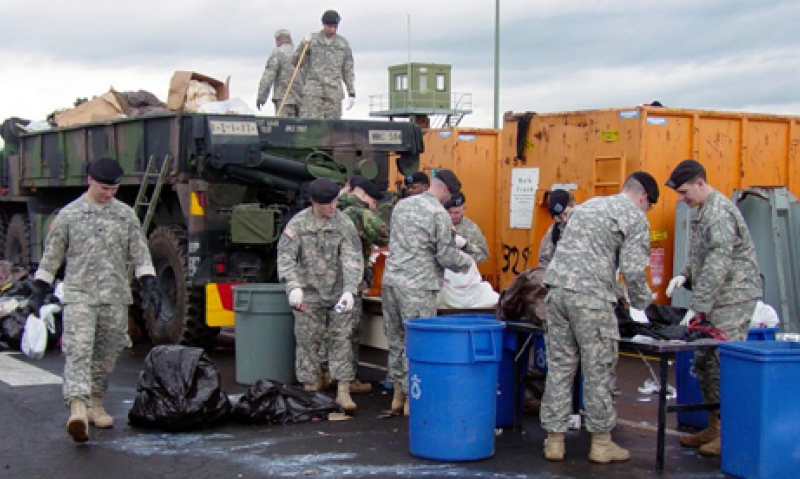
Military supports green initiatives
It seems that everyone is going green nowadays - Wall Street and Main Street, schools and hospitals, car companies and TV networks, even oil companies. And now the green tide has hit the military.
Examples of the military going green are seemingly everywhere. For starters, the Department of Defense is replacing the fluorescent lighting in one wedge of the Pentagon with 4,200 LED lights that will yield a 22 percent energy reduction, according to claims cited by CNET. DoD also plans to convert its fleet of 50,000 commercial vehicles to electric cars and hybrids by 2015.
Toward that end, in fiscal 2009 the Army spent more than $50 million on so-called "green buildings" - structures that "reduce environmental impact by using healthier and more resource-efficient means of construction, renovation, operation, maintenance and demolition." The Army has also set a goal to lease up to 4,000 neighborhood electric vehicles (NEVs) as part of what the Army calls "a far-reaching energy security strategy designed to save energy and money and to wean the Army from fossil fuels." The NEVs will be used on base to conduct security patrols, transport passengers, and carry out maintenance and delivery services, according to an Army statement. In addition, the Army is in the process of developing diesel-hybrid trucks that consume less fuel and, not coincidentally, are thousands of pounds lighter than their predecessors.
In a one-year span, Fort McPherson in Atlanta recycled 860 tons of trash, including paper, cardboard, glass, metal and cell phones. Moreover, spurred by requirements that each branch of the military "purchase or generate at least 25 percent of the energy they consume from renewable sources by 2025," as AP reports, Stewart Air National Guard Base in Newburgh, N. Y., is getting a new solar energy farm.
But the greening of the military extends far beyond recycling, zipping around base in hybrid cars and changing light bulbs. The Air Force, for example, is exploring the use of synthetic fuels in its aircraft. Already, B-52s, C-17s, B-1Bs and F-22s have tested or are in line to test "domestically-sourced synthetic fuel alternatives" and synthetic fuel blends. One Air Force official reported in 2008 that the goal is to have "the entire Air Force fleet [synthetic-fuel] certified by early 2011," adding that the Air Force wants "to reduce demand, increase supply and change the culture within the Air Force so that energy is a consideration in everything we do." Likewise, Navy officials talk about a "Great Green Fleet" comprised solely of ships powered by nuclear energy or bio-fuel, as Fast Company magazine reports. There is even a cleverly named "Green Hornet" in development, which is an F/A-18 that flies on bio-fuel.
Britain's military is supporting the green initiative as well as its arms-builder, BAE Systems, stated its goal is to develop weapons that "impact as little as possible on the environment," according to one BAE official. In fact, the United States is already using so-called "earth-friendly ammunition" in certain venues and even engaging in what might be called "green training" from time to time. In 1997, for example, an Evironmental Protection Agency regional office ordered the Army to stop using lead ammunition, explosives, propellants and demolition materials at a facility in Massachusetts, citing the Safe Drinking Water Act. The troops were then forced to train with biodegradable ammo rather than the real stuff. And at Fort Leonard Wood in Missouri, environmental activists pressured state officials to block the Army from deploying fog oil during nighttime training - and to limit daytime use of fog oil to short increments.
Overall, given that the Defense Department is the nation's largest consumer of energy, more efficient use of energy by the U.S. Armed Forces makes sense. Indeed, if sensible conservation efforts by the military can lower costs and decrease dependency on oil-producing states that do more to undermine America's role in the world than support it - think Venezuela or Saudi Arabia - then such efforts serve the national interest. But going green for the sake of political correctness or good PR does not. And that's what worries me about forcing the military to be environmentally friendly.
